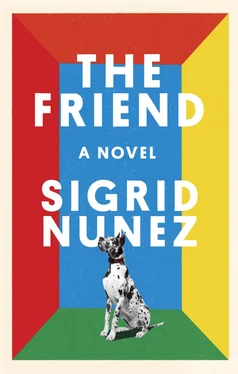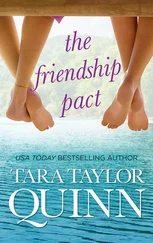• • •
They keep coming. Announcements of opportunities to study writing paired with some other activity. You can write and enjoy gourmet food, write and taste wines, write and hike in the mountains, write and sail on a cruise ship, write and lose weight, write and kick your addiction, write and learn to knit, cook, bake, speak French or Italian, et cetera. Today, a flyer for a literary festival: Who says writing and relaxation don’t mix? Enjoy the perfect getaway: a writing workshop spa retreat. (Mani-Pedi-Story, O.P. quips.)
• • •
At the bookstore. A friend’s most recent novel, published last year, is now out in paperback. Chagrined to realize that not only have I still not read it, I had forgotten all about it.
• • •
At the eye doctor’s. A middle-aged woman with dyed-black hair the exact shade of her leather jacket enters the waiting room. I have a familiar feeling about her and almost cry Aha! when I see the logo of The New York Review of Books on her tote bag. She sits down and pulls out an issue of—the London Review of Books .
• • •
Academic joke making the rounds: Professor A: Have you read that book? Professor B: Read it? I haven’t even taught it yet.
• • •
In the faculty club. Another teacher and I drink gin and amuse ourselves speculating: in the event of a school shooting, which of our students would we or would we not take a bullet for.
• • •
Sometimes in the banner, other times in a right-hand window, or waiting, a surprise to be revealed as I scroll down the screen: James Patterson. James Patterson, the bestselling author in the world, who has placed, consecutively, more than twenty times at number one on the New York Times bestseller list. Who, apparently of a modesty as vast as his success, believes equal success to be within easy reach of, well, anyone. Or at least anyone possessing ninety dollars for the twenty-two video lessons plus exercises he’s offering, thirty-day money-back guarantee. Stop reading this and start writing. James Patterson, one of the world’s richest authors, net worth $700 million (probably more now). Focus on the story not the sentence. His image: elderly, kindly, relaxed. A normal guy, bespectacled, in a dark blue sweater. Defeat the blank page! Sometimes shown writing on a legal pad (never a computer) . What are you waiting for? You too can write a bestseller. James Patterson. Always popping up, urging, coaxing, promising the world. Like the devil.
• • •
Are you kidding? says a friend who raises goats on a farm upstate and makes award-winning chèvre. Writer’s block was the best thing that ever happened to me.
• • •
The anniversary of your death. I want to mark the event but don’t know quite how. Not for the first time I go online and watch a video of you giving a reading. I have never seen Apollo respond to a screen, and that includes television (his eyes don’t appear to focus on any screen image, not even if it’s another dog). If I let him listen, I think he would recognize your voice. What stops me from finding out for sure is the thought that this might be cruel. He may be my dog now ( my dog! ), but I don’t believe he’s forgotten you. What might hearing your voice do to him? How can he understand? What if he thinks you’re trapped inside there?
A story about Judy Garland’s children watching The Wizard of Oz for the first time. She happened to be away, working abroad, when the children and their nanny sat down to watch the movie, which was playing that day on TV. Though she was well past the age when she’d played Dorothy (sixteen), the children knew their own mother. So that’s where she was! Carried off to the witch by the flying monkeys! In an emotional state that does not bear thinking about, the children burst into tears.
• • •
In the post office. A young woman accompanied by a spotted mutt enters and gets in line. A clerk behind the counter says, No dogs allowed in here, miss. He’s a service dog, the young woman says. That’s a service dog? says the clerk. Yes , snaps the woman with such fierceness that the clerk responds cautiously. I was just asking, miss. I mean, I don’t see any badge or sign. The customer standing in front of the woman turns around, eyes her, eyes the mutt, and turns back, shaking his head. The woman draws herself up. She scalds us all with a look. How dare you. This dog is my emotional support companion. How dare you question his right to be here.
What makes this odd scene even odder is that the dog is missing a hind leg.
• • •
Watching Apollo sleep. The peaceful rise and fall of his flank. His belly is full, he is warm and dry, he has had a four-mile walk today. As usual when he hunched in the street to do his business I guarded him from passing cars. And, in the park, when a texting jogger bore down on us, Apollo barked and blocked his path before he could run into me. I have played several rounds of tug-of-war with him today, I have talked to him, and sung to him, and read him some poetry. I have trimmed his nails and brushed every inch of his coat. Now, watching him sleep, I feel a surge of contentment. There follows another, deeper feeling, singular and mysterious, yet at the same time perfectly familiar. I don’t know why it takes a full minute for me to name it.
What are we, Apollo and I, if not two solitudes that protect and border and greet each other?
It is good to have things settled. Miracle or no miracle, whatever happens, nothing is going to separate us.
Everyone I know is writing a book, the therapist tells me unnecessarily. I meet a lot of writers, and I can tell you writer’s block is pretty common.
But I’m not there to talk about writer’s block. If I weren’t so anxious to be on my way I would explain. Usually when a writer sees that someone else has just published a big piece in a major publication on the very topic they’ve been working on, they feel dismay. I felt relief. (Well, okay, then, said the editor, sounding relieved himself: I guess you’re off the hook.)
To draw me out, the therapist asks what I did for the holidays. When I tell him he says gently (he says everything gently), Sounds like that’s one of the ways your loss has affected you: not wanting to be with other people.
Hating to be with other people, I don’t say. Terrified of being with other people.
But the truth is, even if I hadn’t been worried about leaving Apollo I’d have wanted to be alone.
Strays is what a writer I recently read calls those who, for one reason or another, and despite whatever they might have wanted earlier in life, never really become a part of life, not in the way most people do. They may have serious relationships, they may have friends, even a sizable circle, they may spend large portions of their time in the company of others. But they never marry and they never have children. On holidays, they join some family or other group. This goes on year after year, until they finally find it in themselves to admit that they’d really rather just stay home.
But you must see a lot of people like that, I say to the therapist.
Actually, he says, I don’t.
• • •
A moment here to retrieve something from the past. For two years when I was in college I earned pocket money working for a couples therapist. The entire job consisted of typing up the transcripts of the therapist’s sessions. This was not to help in the treatment of clients but because the therapist was planning to write a book. The couples were mostly middle-aged, and all were married. (The therapist disliked the term marriage counselor , calling it fusty.)
Читать дальше












